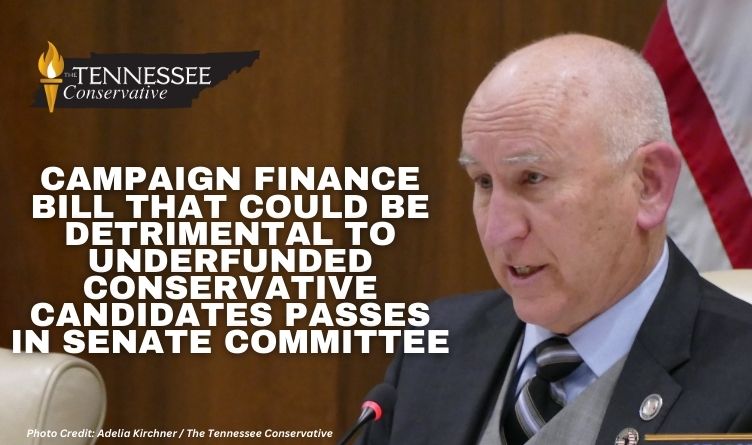Photo: Sen. Richard Briggs (R-Knoxville-District 7) Photo Credit: Adelia Kirchner / The Tennessee Conservative
The Tennessee Conservative [By Adelia Kirchner] –
On Tuesday, a complex campaign finance bill passed out of the Senate State and Local Government Committee by an 8-1 vote.
Republican Senators Richard Briggs, Todd Gardenhire, Tom Hatcher, Ed Jackson, Adam Lowe, Kerry Roberts, and Page Walley voted in favor of the legislation, along with Democrat Sara Kyle.
Democrat Senator Jeff Yarbro was the only no vote.

Senate Bill 229 (SB0229), sponsored by Sen. Richard Briggs (R-Knoxville-District 7), requires “certain officials in the executive branch to receive ethics training from the bureau of ethics and campaign finance; makes certain records of the bureau of ethics and campaign finance public; distributes 80 percent of the privilege tax collected from lobbyists to the bureau of ethics and campaign finance” and “makes other changes to the operation of the bureau of ethics and campaign finance.”
As Tennessee Conservative News Reporter Olivia Lupia previously noted, this legislation contains many provisions which appear to “subtly, yet extensively, shift many of the state’s already complex campaign finance processes.”
For reference, the term “political campaign committee” is used within the bill’s language to refer to political action committees (PACs).
Since Sen. Briggs presides as Chair over the Senate State and Local Government Committee, Vice-Chair Sen. Page Walley (R-Savannah-District 26) filled in during consideration of SB0229.

According to Sen. Briggs, this six-page piece of legislation was brought to him by the Bureau of Ethics and Campaign Finance.
As the bill sponsor explained in committee, SB0229 will require PACs to pay a $150 registration fee to the Bureau of Ethics and Campaign Finance in order to “partially offset the cost incurred by the registry in regulating those PACs.”

Bill Young, Executive Director for the Bureau, told the committee that this registration fee would apply to “each and every political campaign committee.”
“The General Assembly has tried that before,” said Young, “but it exempted out certain campaign committees, and the courts held that was invalid. This one picks them all up. We think that those political campaign committees should share part, a small part really, of the cost of what we do just like our lobbyists and employees of lobbyists do. They currently pay fees to us.”
According to Sen. Briggs, this legislation would also allow the registry of elections and the ethics commission staff to conduct investigations of sworn complaints or to immediately set up a sworn complaint for a show cause hearing without an automatic referral for audit and an investigation by the state attorney general’s office.
Under this legislation, all sworn complaints filed with the ethics commission would be public record. Whereas current law makes commission members and staff keep complaints confidential either until they are dismissed or a show cause hearing is set.

SB0229 further clarifies that political candidates may use campaign funds “to advance or support the candidate’s nomination for election or election to office or to challenge the legitimacy of a potential opponent’s candidacy, but the funds cannot be used to defend the candidate’s standing or reputation in a community.”
“The way current law works, is you can use campaign funds if it’s for campaign purpose or an office holder purpose. You can’t use them for a personal purpose,” said Young.
SB0229 would allow a candidate to use campaign funds before a campaign even starts, for challenging or defending against a qualification petition because those costs would be related to the candidate’s campaign.
“The distinction here that we’re trying to make clear is that if you are defending a defamation suit or you’re bringing a defamation suit or something of the like that really doesn’t have anything to do with your campaign or your office holder position then that’s personal in nature, but anything that arises out of the campaign itself would be allowable to use campaign funds,” said General Counsel for the Bureau, Lauren Topping.
Additionally, Section 14 of the legislation requires 80% of the annual professional privilege tax, which is paid by registered lobbyists, to be allocated to the bureau’s budget for the purposes of updating their current website which is over twenty years old, and to further offset costs.
“Over the last two years we’ve been talking to other states, possible contractors. We understand it would cost about $3 Million to overhaul that system and then another $800,000 a year to administer it if we do it externally,” said Young.
Now that SB0229 has passed in the Senate State and Local Government Committee, it has been referred to the Senate Finance, Ways and Means Committee and will be scheduled for consideration at a later date.


About the Author: Adelia Kirchner is a Tennessee resident and reporter for the Tennessee Conservative. Currently the host of Subtle Rampage Podcast, she has also worked for the South Dakota State Legislature and interned for Senator Bill Hagerty’s Office in Nashville, Tennessee. Adelia is The Tennessee Conservative’s on-site reporter for the Tennessee General Assembly. You can reach Adelia at adelia@tennesseeconservativenews.com.


